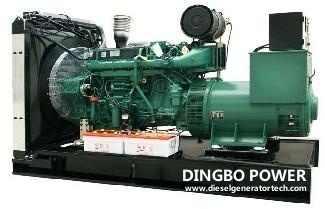Industrial emergency generators ensure that critical industries are always powered. The industry standard is diesel generators, which are widely used as stand-alone and emergency units for telecom towers, construction, campers, events, boating, etc. Next, the diesel generator supplier will share the following content with you.
Modern diesel generators have overcome the disadvantages of earlier models with higher noise and maintenance costs. They are now quieter and require less maintenance than similarly sized gas engines.

Maintenance costs are relatively low. This is because the generator's engine requires fewer parts to start, so you don't have to worry about replacing spark plugs or rebuilding carburetors like you would with a gas engine.
Durability. Diesel engines are very rugged in the workplace, so they can withstand a lot of wear and tear in a variety of environmental conditions.
Safe storage. While still flammable, diesel has a much lower risk of ignition than other types of fuels, such as gasoline.
Power output. Diesel generators can handle larger electrical loads and run longer than other types of generators available.
More robust and reliable.
Easy access to fuel. Portable diesel generators are usually transported in the back of a diesel vehicle. This means you don't need to use two different fuel types when you're out and about and working.
Diesel engines are more fuel efficient than gasoline engines. This means longer run times when running at the same capacity. Some diesel engines consume up to half the fuel of a compatible gasoline engine.
Diesel fuel is cheaper than gasoline meaning they are cheaper to run.
Diesel engines require less maintenance. Part of the reason is that diesel engines do not have spark plugs or carburetors. This means there is no need to replace spark plugs or rebuild carburetors.
In terms of service life, diesel engines last much longer. Compared to a typical gasoline engine, a diesel engine can last up to three times longer.
Diesel is safer and has less ignition risk than gasoline.
Maintenance is a key consideration for any generator. Manufacturers recommend following a specified maintenance schedule to keep your generator running during peak hours. Usually, this will occur after a certain amount of service time. Any time you find that your generator is not as efficient as it should be, you should perform maintenance.
It is also a good idea to perform maintenance whenever a major weather event occurs. For example, after a dust storm or heavy rainfall. Exposure to dust and other air pollutants can greatly affect generator performance, cause filters to clog, and make it more difficult for the generator to do the same job.
While diesel generators are less demanding to maintain, certain tasks require regular operation. These include.
Performing general inspections of all components.
Drain and replace coolant, oil and fuel.
Cleaning or replacing filters.
Testing generator batteries.
Running the engine to test operation.
Regular maintenance will help maximize your investment in your diesel generator. Keep up with your maintenance tasks and make any repairs in a timely manner and your generator will be working for years to come. We recommend that you develop a preventive maintenance plan in advance. This ensures that your generator is operating at peak efficiency. Be sure to keep a log of these inspections so you can refer to them if necessary.
Copyright © Guangxi Dingbo Generator Set Manufacturing Co., Ltd. All Rights Reserved | Sitemap
Update cookies preferences